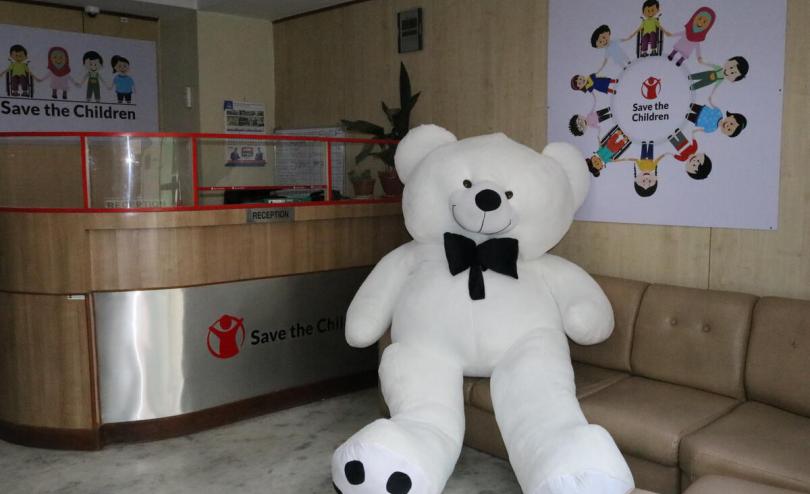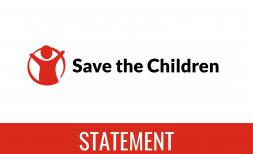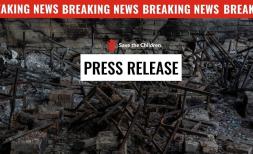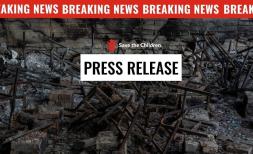Bangkok's children exposed to toxic air seven out of ten days in 2023 – Save the Children

Saathi, the Air Bear. The Air Bear initiative is part of Save the Children’s 'Generation Hope' campaign that aims to raise awareness of the impact of the climate crisis. Photo credit: Ayush Joshi/Save the Children
BANGKOK, 20 February 2024 - Daily data analyzed by Save the Children from 12 of Bangkok’s air monitors[1] showed that children in Bangkok breathed in air classified by the World Health Organization (WHO) as unsafe, or over 15 μg/m3, for 265 out of 365 days of the year. This is in stark contrast to other world capitals like London, where children were only exposed to levels of air pollution exceeding WHO guidelines for seven days of 2023.
Air quality in Bangkok became so bad this month that Thai authorities ordered government employees in the capital to work from home, urging others to do the same. [2] At the start of February, as many Thais prepared to celebrate the lunar new year holiday, Bangkok’s city hall asked worshippers to refrain from burning paper offerings and incense sticks at traditional shrines – a customary part of the annual festivities – to avoid exacerbating the city’s air pollution problem.[3]
Regional experts are meeting this week in Bangkok to discuss progress on the United Nations’ Sustainable Development Goals (SDGs), including Goal 13 on Climate Action. The Asia-Pacific region is currently projected to miss 90 per cent of the 118 measurable targets by 2030, according to the UN.
While air pollution affects everyone, children are among the most vulnerable because their bodies, organs and immune systems are still not fully developed. Children also absorb more pollutants than adults as they tend to breathe faster.
Thailand is not alone in this problem. Almost all of Southeast Asia’s 673.7 million people live in areas where annual fine particulate air pollution [4] (PM2.5) exceeds the WHO guideline of 5 µg/m³. This reduces the life expectancy of a person living in Southeast Asia by 1.6 years relative to what it would be if the WHO guideline was met.[5]
Aashmi, 16, a passionate climate campaigner from Nepal who is attending the Bangkok forum this week said:
“The climate crisis is hurting children, their rights, and their future. Air pollution is choking us. My message to policymakers and leaders in Bangkok this week is to listen to the experiences of children. We are the ones who contribute the least to the climate crisis but will pay the biggest price.”
Aashmi is part of Save the Children’s multi-country Red Alert initiative in Asia which enables those with the most to lose from the climate crisis – today's children - to make their voices heard. She was joined by Saathi, which means friend in Nepali – a giant white teddy bear which has travelled around Nepal to raise awareness about air pollution.
Guillaume Rachou, Executive Director, Save the Children Thailand:
“Air pollution has a devastating impact on children’s lives. Here in Thailand, we’ve seen first-hand the impact it can have on their play and education. We hope that this week’s regional forum will encourage influential stakeholders and policy makers to address air pollution urgently and create a better future for all children.”
Thailand, however, has not stood by silently and watched its air pollution crisis unfold. Last year, its cabinet approved a draft clean-air act to reduce pollution. The draft law aims to regulate activities that create pollution including factories, businesses, agriculture, and transportation.
Bangkok is hosting the Asia Pacific Sustainable Development Forum (APSFD) this week – a meeting that hopes to empower countries, particularly the least developed countries and landlocked or small island nations, in their efforts to achieve the 17 Sustainable Development Goals and their targets by the 2030 deadline.
ENDS
Notes to editors
In 2021 WHO updated its guidance to state that people should not be exposed to a 24-hour level of PM2.5 over 15 micrograms per cubic meter (μg/m3) or an annual average of 5 micrograms per cubic meter (μg/m3).
Data is based on an analysis of daily air quality between 14 February 2023 and 13 February 2024, averaged across 12 Bangkok air monitors listed on air4thai.pcd.go.th. Data for these monitors was accessed through the Open AQ platform.
Monitoring data for London is taken from the London Air Quality Network from Imperial College London’s Environmental Research Group.
Saathi -- the Air Bear is a part of Save the Children's flagship child led campaign Generation Hope. The ‘Air Bear’ - a giant 12-feet white bear has traveled to different parts of Nepal, and recently took park in UNGA 2023 and CoP28 to herald conversations related to the depleting air condition and its impact. The white bear will gradually turn brown, symbolizing the impact of air pollution on the environment and the health of children and young people.
[1] Bangkok has dozens of official and unofficial air monitors dotted around the city. Save the Children analyzed 12 monitors that were included in summary reports by the Thai government website Air4Thai.
[2] https://www.reuters.com/world/asia-pacific/thailand-warns-high-pollution-capital-asks-govt-staff-work-home-2024-02-15/
[3] https://www.bangkokpost.com/thailand/general/2738790
[4] Fine particulate air pollution refers to tiny particles that can get into people’s skin and lungs and cause heart and lung disease and other illnesses. These particles come from things such as coal plants, cars and from burning waste.
[5] https://aqli.epic.uchicago.edu/wp-content/uploads/2023/08/SE-Asia-FactSheet-2023_Final.pdf
*******************************************************************************************************************
For further enquiries please contact:
Amy Lefevre, Global Media Manager, Asia (based in Bangkok): Amy.Lefevre@savethechildren.org
Aisha Majid, Data Media Manager (based in Madrid): aisha.majid@savethechildren.org
Our media out of hours (BST) contact is media@savethechildren.org.uk / +44(0)7831 650409
Please also check our Twitter account @Save_GlobalNews for news alerts, quotes, statements and location Vlogs.




